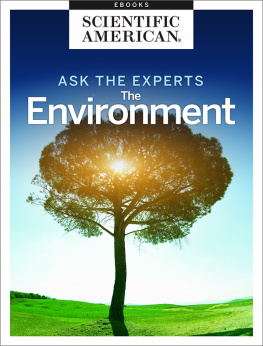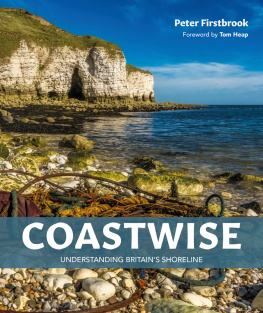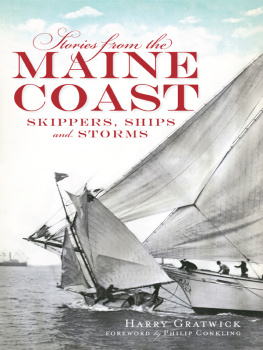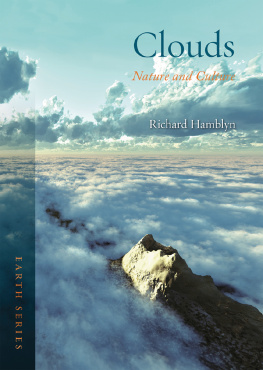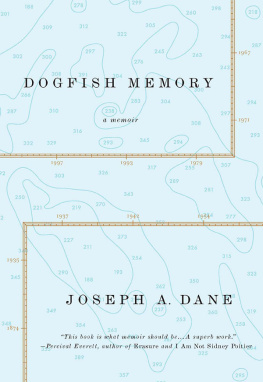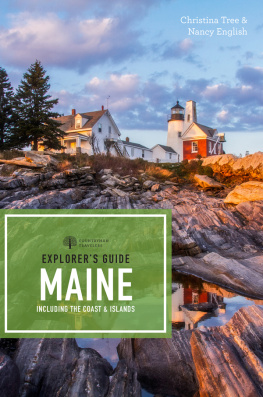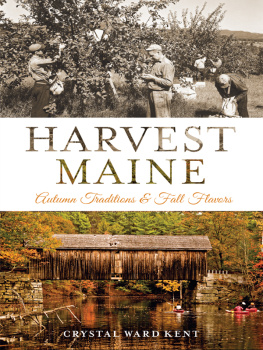Contents
Guide
I t takes a village to write a decent book and I am grateful to the fellow writers, friends, and family too numerous to mention by name who commented on earlier renditions of the chapters in this book and helped shape it into its current form. Extra thanks are due to Janet Falon, who suggested I compile my essays into a book, and Jonathan Callard for his creative nonfiction writing classes and his detailed critiques. Im also grateful to Sy Montgomery for being so enthusiastic about my writing, encouraging me to publish, and leading me to Down East Books. There I am thankful for Michael Steere, who recognized my book was more than just a memoir and took it under his wing. Thanks are also due to the scientists Duane and Ruth Braun, Bernd Heinrich, Edvard Moser, and Kate Petrie, who reviewed for accuracy various sections relevant to their areas of expertise. Im also grateful for the friends and family who make appearances in the book and graciously let me write about them, and for my loving and supportive husband Frank Chudnow who jokes that he is not in the book enough. Finally, I am especially grateful to Maine and how it has shaped me and my understanding of the natural world, sustained me through difficult times, and continues to awe me with its beauty.
Those who dwell, as scientists or laymen, among the beauties and mysteries of the earth are never alone or weary of life.
Rachel Carson, The Sense of Wonder
I t was still drumming its pulsating rhythm onto my palm, blood squirting out with each beat.
I was only five when my dad cut the heart out of a dogfish shark and plopped it into my hand. Most children at that age might have been horrified at the bloody spectacle filling my palm, and I was alarmed to some degree. But there was also something puzzling, precious, and thrilling about holding this heart with a life of its own, at least for the few seconds until it sputtered to a stop.
That day was already unusual because my older brother Joe and I were spending it with my dad. Normally it was my mom orchestrating our summers in Maine, taking us blueberry picking or swimming in a lake so clear it was easy to find and catch tadpoles on its marshy fringe. But Mom probably wanted a break from us kids, so she suggested Dad show us his lab, one of several weathered gray cedar shacks edging a rocky shore. My father worked during the school year as a biomathematician for the National Institutes of Health in Maryland. But in summer, he joined scientists who journeyed from all over the world to do research at the Mount Desert Island Biological Laboratory because of the labs access to marine experimental animals.
Joe and I ran around looking at all the sea creatures housed there, scampering from dogfish and skates corralled in pens in the bay, to eels and urchins in large glass tanks. Seawater piped in from the ocean circulated in the tanks, providing the comforting sound of trickling water.
Then my dad brought us over to the pen that held the dogfish, on which he did his kidney research. With big eyes, I watched him net one of these wild sharks in the pen. As long as I was tall, the slate-colored dogfish thrashed awhile in the net, throwing off a shower of sun-sparkled drops. It was still struggling when we entered my dads lab shack, and I shrank back from this monster-like creature he had to wrestle onto his lab bench in order to split open its belly with a knife.
In his professorial manner, he pointed out the floppy liver, the long stomach, and the numerous coral-colored gill slits that looked like the undersides of mushroom caps. But what stayed with me most was the heart. Although only the size of a quarter, it loomed large in memory. Like the telltale heart of Edgar Allan Poe, it continued to haunt long after this bloody introduction to biology.
I wanted to know what made it beat.
It must have haunted my brother as well. Years later, after getting a degree in biophysics, Joe went on to research exactly how nerve signals get heart muscle cells to contract. Both of us, like our dad, never lost our childlike curiosity and were compelled to probe what we encountered more deeply and intimately so as to understand how nature worked.
Curious about everything, as a child I lay awake at night trying to understand basic feats of nature. Why does it rain? or How do birds know where they are going when they come back here in the spring? I asked my dad when he poked his head in my darkened room to see if I was sleeping. With the yellow hall light haloing his head, my father would patiently provide long, detailed answers to each of my questions, solving many of the mysteries that were keeping me up at night.
My mother thought science was boring, except for the science that explained how people interacted and what churned their emotions. A psychology major in college, after my mom had been a housewife for many years, she earned a degree in social work and became a therapist. So what? she said when astronauts planted the flag of the United States on the surface of the moon in a televised broadcast that mesmerized millions. So what? she said when Joe returned from college and he and my father talked about their research at the dining room table, their hands waving excitedly as they debated the latest theories in physiology. Theyre talking science again, she sighed, shaking her head. Then she pulled me by the hand and said, Lets go to the living room and read together, assuming my complicity in her disdain. Loving to read and eager for her solitary attention, I followed her, drinking up the camaraderie of women in arms against men of science.
It was my mother who gave me a love of literature, introducing the worlds that could be found between the pages, from glittery and impoverished czarist Russia in Nicholas and Alexandria, to Margaret Meads licentious Samoa. Because of my mothers influence, at a young age I was transported to the misty heaths of Wuthering Heights and Jane Eyre, and was delighted to enter Frances Hodgson Burnetts secret garden, at one with the main character who nurtured a neglected plot back to its former beauty. Mom was my guide to the written word, the one who edited the school essays and introduced me to poetry. She was so unlike my father, who was a man of numbers, not words. When Dad was a child and forced to write home each week from camp, he repeatedly penned the same exact six words to my grandmother: Dear Mom, Im good. Love, Cliff.
Neither parent expected me to pursue science. This is not surprising given that it was the sixties, a time when most women did not venture into professional careers other than teaching or nursing. When the second wave of feminism crested in the 1970s, my mother went along with the tug of that tide, urging me to mark law as my intended major when applying for colleges. I complied, unaware of a scientific mind that lay hidden behind a heavy curtain of both societal and familial expectations. But after arriving at the University of Wisconsin and flipping through the pages of a thick book listing all its course offerings, I was drawn to classes that could answer my questions. Needing to know what formed the stars and galaxies, I signed up for astronomy. Needing to know what made the houseplants lining the dorm windowsill thrive, I signed up for horticulture. Needing to know how the birds navigated their migrations, I signed up for ornithology. All the courses I wanted to take were science courses except for a course on English literature, warm memories of reading together with my mom on the couch dictating that choice.
Youd think certain episodes in my childhood would have deterred me from science. Like the time my parents friend, who researched spinal cord disorders, kiddingly asked if he could use our dachshund Moxie for one of his experiments. Being only six years old at the time and not realizing he was joking, I was horrified and always hid Moxie in my room whenever he came to visit. Or the time we received a letter notifying us that our pet guinea pig had been accidentally sacrificed. My father asked his lab in Maryland to take care of the animal over the summer when we were in Maine, but somehow the lab tech confused our black-and-white spotted Scruffy with the experimental animals and it became a martyr for scientific explorations.


